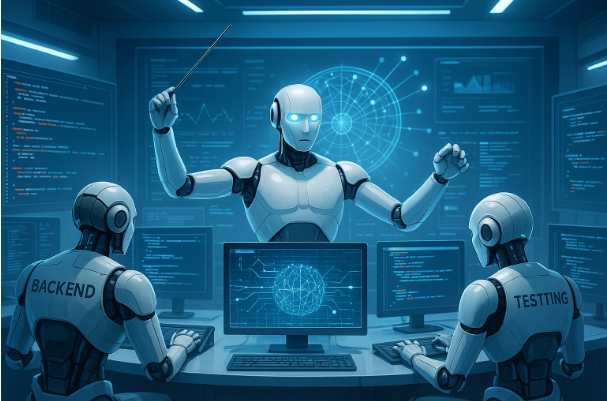OpenAI’s coding AI ‘Codex’ has evolved from a simple code generation tool to a team-level development agent, transforming the software development paradigm. As a result, the employment rate of programmers in the United States has fallen to its lowest level since 1980, and the role of developers is being redefined from code writers to AI managers.
Coding AI Opens Team Development Era
OpenAI’s Codex has greatly evolved from existing code auto-completion tools. This system features ‘multi-agent collaboration’ capabilities where multiple AI agents can simultaneously work on different roles.
The Codex recently released by OpenAI has evolved beyond a simple code generation tool into an AI agent system optimized for software engineering. The most innovative aspect of this system is that multiple AI agents can collaborate like a development team on a single project.
Codex can automate everything from code writing to commits, PR creation, and code reviews through perfect integration with GitHub. It also features automatic testing functions that create and run test cases simultaneously with code generation.
Shocking Changes in Developer Job Market
The development of AI coding technology is causing major changes in the developer job market. Microsoft implemented a large-scale workforce restructuring in early 2025.
Microsoft (MS) carried out a major workforce restructuring in early 2025. Notably, the reduction included developers (coders) based on the judgment that AI could replace a significant portion of development work, not just for cost savings.
According to the U.S. Bureau of Labor Statistics, the employment rate of programmers in the United States plummeted to its lowest level since 1980 in the first quarter of 2025. Junior-level coders and general programmers were hit hardest. In contrast, fields such as AI development and management, machine learning engineering, and prompt engineering are experiencing a polarization phenomenon with greatly increased workforce demand.

Microsoft CEO Satya Nadella said, “With the advancement of AI, most jobs for developers who only perform simple coding tasks will disappear within the next five years. We are witnessing the biggest paradigm shift in the history of software development.”
Duolingo Succeeds with AI-First Strategy
Language learning app Duolingo is a case study of successfully innovating its business model by actively adopting AI. Duolingo officially declared an ‘AI First Strategy’ from 2023 and placed AI at the center of all corporate activities.
Duolingo reduced the development period for new language courses from 18 months to just 10 weeks using AI. In particular, AI automatically analyzes the learning difficulty of each language and designs optimal learning paths, dramatically streamlining the content creation process.
Duolingo CEO Luis von Ahn said, “We think of AI not as a simple tool but as a team member. Currently at Duolingo, one developer with AI assistance is handling work that previously required 10 people. This is not just an increase in efficiency, but a fundamental change in how we work.”
As a result of this strategy, as of 2024, Duolingo’s new language course release speed increased threefold, and development costs were reduced by 70%. Learner satisfaction also improved by 15%.
Redefining Capabilities for Developer Survival in the AI Era
To survive as a developer in the AI era, a redefinition of existing capabilities is necessary. The ability to effectively utilize and coordinate AI tools is becoming more important than code writing skills.
The ability to effectively utilize and coordinate AI tools becomes more important than simple coding skills. Like an orchestra conductor harmoniously leading various instruments, developers who can integrate and manage multiple AI systems will create high value.
System design and architecture capabilities are also becoming more important. Even if AI writes code, it is the developer’s role to design how that code should be organized structurally. Additionally, the ability to apply AI based on a deep understanding of specific industries or business domains is expected to be a differentiating factor.
Promising development fields in the AI era include AI security and safety, prompt engineering, physical AI systems, and AI orchestration.
Expert Outlook
Experts analyze that the advancement of AI is not simply threatening developers’ jobs but redefining the role of developers and creating new opportunities. Just as the industrial revolution reduced simple labor when machines emerged but created new jobs for handling and designing machines, the role of developers in the AI era will not disappear but transform.
Experts advise that it is important to actively embrace these changes rather than fear them, and to develop capabilities to adapt to the new environment.

